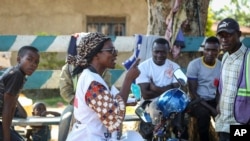The World Health Organization reports the COVID-19 pandemic and lack of money are hampering efforts to bring a speedy end to the Ebola outbreak in Democratic Republic of Congo’s Equateur Province. Since the outbreak was declared June 1, 56 cases, including 20 deaths have been recorded.
Shortly after Ebola was detected in the DRC, World Health Officials expressed confidence they would be able to quickly control the spread of the deadly virus. They noted many lessons had been learned from previous outbreaks. They said the availability of a vaccine, and therapeutics could help them prevent the onset of the disease and treat those who fell ill.
World Health Organization spokeswoman, Fadela Chaib says these new tools are being used to good effect. Over the course of four days, she says 12,000 people have been vaccinated.
However, she says it is difficult to contain virus spread because cases are scattered across a remote, dense rain forest area. Additionally, she says WHO has less than $2 million, which will allow it to carry out this costly operation for a few more weeks.
“After that, we are short of money. We need this money for key services," said Chaib. "For example, health education, community engagement, vaccinations, testing, contact tracing, treatment, etc.”
This is the 11th Ebola outbreak in DRC. An epidemic that broke out in this same region two years ago was crushed after just four months. The current outbreak was preceded by a devastating epidemic in conflict-ridden North Kivu and Ituri provinces. That outbreak, which was declared August 1, 2018, infected more than 3,460 people and killed 2,280 before it was stopped at the end of June.
Chaib says gaining the trust of local communities is essential in successfully combatting this deadly virus and no effort is being spared to achieve this. For example, she tells VOA most of the vaccinators are being drawn from the local population.
“Despite all our work there is a lot of fear and stigma surrounding the Ebola virus. It is complicating the response," said Chaib. "This being said everyone at WHO…are working to control this outbreak. It is challenging. It is difficult but it is not impossible. We know how to do it.”
WHO acknowledges the complexities of responding to Ebola during the ongoing COVID-19 pandemic. However, it says it is critical not to allow COVID-19 to distract health workers from tackling Ebola and other pressing health threats.




